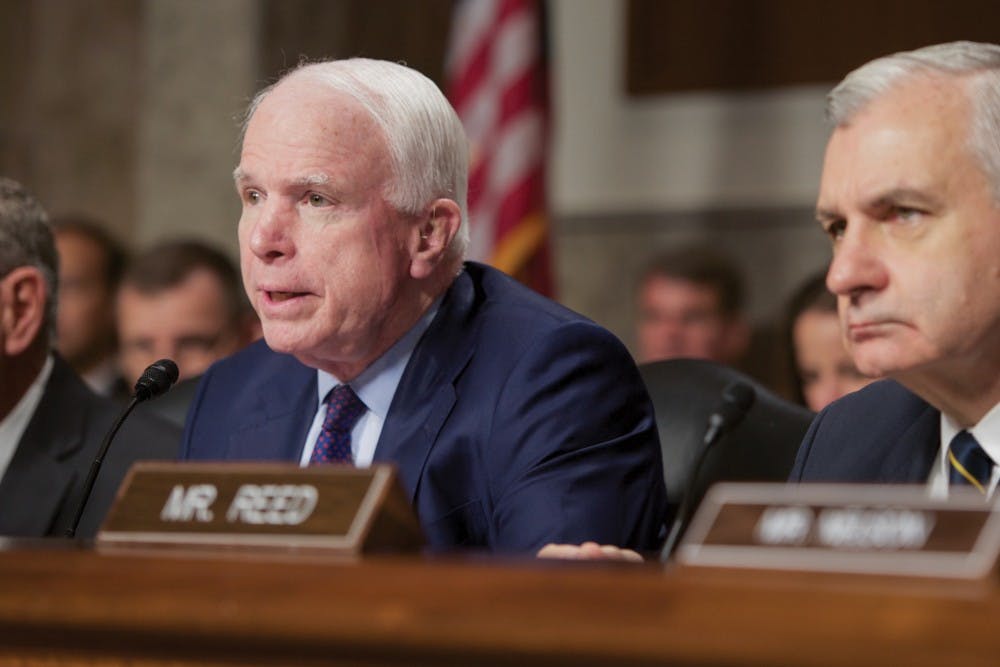
Senator John McCain (R-AZ) had been on the fence on the latest tax plan, but his support gave the bill a massive boost as lawmakers headed into a vote this past weekend. // United States Department of State / Public Domain
In the early hours of Dec. 2, the Senate passed the Republican tax reform bill, marking what pundits say is the first major legislative victory of Donald Trump’s presidency. The bill paves the way for $1.5 trillion in tax cuts, a lowering of the corporate tax rate, and the elimination of the individual mandate penalty.
The Senate passed the tax bill by a thin margin of 51-49, with one Republican senator voting against the measure.
The Trump administration's proposals for tax reform have caused widespread controversy in recent weeks. The version of the tax bill which was passed by the House of Representatives last month included changes that would have significantly increased the cost of a graduate education. This prompted widespread protest on college campuses nationwide, Penn included. At a rally last week, dozens of Penn graduate students called on Penn President Amy Gutmann to "protect" them from the potential ramifications of the GOP's tax plans.
The version of the bill that passed the Senate poses less of a threat to graduate students. But in the coming weeks, the bill will head to a conference committee to solve the differences between the House and the Senate proposals. This means that the provisions in the House bill that affect graduate education may still become legislation, explained Adrian Rivera-Reyes, a cell and molecular biology doctoral candidate at the Perelman School of Medicine.
Katie Elbert, a third-year chemistry doctoral candidate, said she really hopes that the final tax bill will not include the provision to tax graduate student tuition waivers.
After the conference committee between the Senate and the House, President Donald Trump will have the opportunity to sign the bill into law and enact the biggest changes to the tax code in a decade.
While the Senate bill does not pose a targeted threat to graduate students, it still has a range of implications for those in education. For example, the bill will likely benefit private schools, while lowering the budgets available for public schools, the Washington Post reported.
The fact-checking website PolitiFact also said that several components of the bill would disproportionately benefit wealthier individuals. The tax cuts favor those in the upper quintiles of the tax brackets, as the top 20 percent of Americans would be set to gain 1.9 percent of their income in tax cuts — the largest amount of any quintile.
At Penn, the GOP tax proposal has caused significant debate among political groups such as Penn Democrats and Penn College Republicans. Penn Dems argues that the bill disproportionately hurts the poor, while College Republicans claims that it fosters economic growth and benefits all of society.
College and Wharton sophomore Michael Moroz, co-director of College Republicans Editorial Board, said he was happy that the tax reform measures were finally passed.
“Tax reform is long overdue,” Moroz said. “It’s a big step in easing the burden on taxpayers and making us competitive.”
The bill’s chances gained a massive boost on Thursday morning when Sen. John McCain (R-Ariz.) committed his support. McCain had been on the fence about the tax plan and notably defeated the health care reform bill this summer when he publically commented against it, creating divisions within the Republican party.
“I’m glad McCain was in a good mood,” Moroz joked.
Leaders of Penn Dems were far less optimistic about the bill, criticizing its content and the nature in which it was passed.
“I am incredibly disappointed that the bill passed,” said President of Penn Dems and College junior Rachel Pomerantz.
Pomerantz said she thought the GOP abandoned the fiscal responsibility principles it had championed for decades, citing a report from the Joint Committee on Taxation.
According to the report, the Senate bill will add $1 trillion to the deficit over the span of 10 years, after accounting for economic growth. The report is at odds with GOP lawmakers' predictions that the tax cut would pay for itself through economic growth.
Pomerantz also criticized how hastily the bill was passed. In a rush to include certain last-minute changes to the bill, senators penciled in handwritten notes into the margin of the bill.
“The bill was jammed through at [the] absolute last minute. Senators were presented with a 400-plus-page amendment hours before it was supposed to be voted on,” Pomerantz said. “Republicans should have been willing to debate.”
Political Chair of Penn Dems and Wharton sophomore Dylan Milligan said he was worried about the anticipated effects of the tax bill.
“There’s plenty of data to show the majority of the burden from the change in the tax code is overwhelmingly going towards the young, poor, and the middle class,” Milligan said.
The bill also contains provisions unrelated to tax reform that appeal to religious conservatives. The bill repeals a ban on religious groups participating in political activism, as well as implementing new rights for unborn fetuses.
Staff reporter Manlu Liu contributed reporting to this article.
The Daily Pennsylvanian is an independent, student-run newspaper. Please consider making a donation to support the coverage that shapes the University. Your generosity ensures a future of strong journalism at Penn.
Donate





